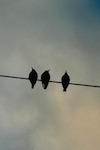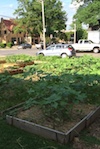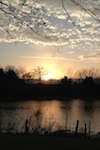 My involvement is about being the guy behind the thing that says, “Pay attention to this.”
My involvement is about being the guy behind the thing that says, “Pay attention to this.”
If I can be the person that directs others to a special thing, I’m perfectly fine and I like that anonymity. That’s my own job well done.
 My involvement is about being the guy behind the thing that says, “Pay attention to this.”
My involvement is about being the guy behind the thing that says, “Pay attention to this.”
If I can be the person that directs others to a special thing, I’m perfectly fine and I like that anonymity. That’s my own job well done.
 Sabbath-keeping is a sturdy axis when the storms of life threaten spring’s hope. The choice of rest when responsibilities pile up seems counterintuitive, yet carving out routine time periods with the Creator provides a steady center while life continues spinning.
Sabbath-keeping is a sturdy axis when the storms of life threaten spring’s hope. The choice of rest when responsibilities pile up seems counterintuitive, yet carving out routine time periods with the Creator provides a steady center while life continues spinning.
It is when we cannot control outcomes that the depth and breath of trust becomes revelation.
 It was in rereading the poems, though, that the poetry got left behind. I started reading these poems as prayers. And not prayers of the animals, but prayers for myself. These are prayers I would never know how to say, for the creature-like movements inside of me are intrinsically inarticulate. These poems are prayers for the animals inside of us — the heavy, slow, frightful, instinctive — those parts of us that fly and plod and bury down.
It was in rereading the poems, though, that the poetry got left behind. I started reading these poems as prayers. And not prayers of the animals, but prayers for myself. These are prayers I would never know how to say, for the creature-like movements inside of me are intrinsically inarticulate. These poems are prayers for the animals inside of us — the heavy, slow, frightful, instinctive — those parts of us that fly and plod and bury down.
 When I saw my garden plot I was surprised at the way it seemed both small and large.
When I saw my garden plot I was surprised at the way it seemed both small and large.
I got to spot the blossom first. Judy first spotted the cluster of green cherry tomatoes, and texted me a photo. I look forward to watching their reddening, and to the day of harvest, to that first burst of pure sunlight in my mouth. But the yield is not high in my goals. Neither, any more, is the work of emptying my mind and dirtying my fingernails.
My primary goal in sharing this garden is to yield to the Overseer’s soul amendments.
 My experience has been that I mistake seasons of “creative dryness” for a season in which it is time to make something else. So, rather than simply waiting for the next moment of inspiration or the next deadline to move you into creative work, move yourself out of your normal discipline and do some painting, drawing, shooting, playing, etc. After all, you are a creature who creates — that is the core of who you are. What you make is secondary.
My experience has been that I mistake seasons of “creative dryness” for a season in which it is time to make something else. So, rather than simply waiting for the next moment of inspiration or the next deadline to move you into creative work, move yourself out of your normal discipline and do some painting, drawing, shooting, playing, etc. After all, you are a creature who creates — that is the core of who you are. What you make is secondary.
With all of this in our hearts, we got in the car and left the hotel, returning home to what we love. Before long, the acute stages of family emergency had passed and everyone moved on to more permanent situations. As things returned to a more normal state, I found myself feeling more placed than ever, letting go of questions about the future and digging in to life as I know it right now.
Whether you believe you have a soul, a personality, or that you are a random blip in a succession of universes, within your person is the very you of you. I’m describing the you that is only you and no one else on the planet. You know you’re not me or your sister or brother. You are you. You have a mind and emotions that feel, think, and imagine. You have a body that has mobility and senses. You have a gender. You’re able to communicate in a number of ways — non-verbally through expressions, with language, with your whole body, and of course with music. Creativity, and specifically songwriting, ought to be the natural outworking of the whole person simply being what he or she is, human.
 In that first class all I could think about were Madonna’s biceps. It was the late 1990s, and Madonna had recently become as famous for her toned physique (attributed to her recent interest in yoga) as for her music. As I looked at myself in the mirror of the studio, awkwardly trying to follow the instructor’s gentle guidelines, I wondered if Madge’s muscle tone would be a happy by-product of my journey into health. “Bring your attention to the breath,” the instructor said, while gently lifting my hips, which were already trembling from exertion. Madonna, her biceps, and my own body scampered away from my attention, as I shifted that attention to my breath. Inhale. Exhale. Inhale. Exhale. On my way home on the subway, faced with the mild anxiety that always seemed to accompany me into cramped spaces, I tried to do the same. Inhale. Exhale. Inhale.
In that first class all I could think about were Madonna’s biceps. It was the late 1990s, and Madonna had recently become as famous for her toned physique (attributed to her recent interest in yoga) as for her music. As I looked at myself in the mirror of the studio, awkwardly trying to follow the instructor’s gentle guidelines, I wondered if Madge’s muscle tone would be a happy by-product of my journey into health. “Bring your attention to the breath,” the instructor said, while gently lifting my hips, which were already trembling from exertion. Madonna, her biceps, and my own body scampered away from my attention, as I shifted that attention to my breath. Inhale. Exhale. Inhale. Exhale. On my way home on the subway, faced with the mild anxiety that always seemed to accompany me into cramped spaces, I tried to do the same. Inhale. Exhale. Inhale.
 It all seemed almost like my own, that was true. But as early romance gave way to marriage, I realized that it is one thing to be from somewhere, to know it by heart, and another to adopt a place or have it chosen for you. My marriage chose Atlanta for me, and I was then adopted by my husband’s many circles of friends. Yet until our last year or so there, though, I had an indistinct feeling of being on the outside looking in — someone who belonged more by association than creed.
It all seemed almost like my own, that was true. But as early romance gave way to marriage, I realized that it is one thing to be from somewhere, to know it by heart, and another to adopt a place or have it chosen for you. My marriage chose Atlanta for me, and I was then adopted by my husband’s many circles of friends. Yet until our last year or so there, though, I had an indistinct feeling of being on the outside looking in — someone who belonged more by association than creed.
 Before, I’d wanted to be a fireman
Before, I’d wanted to be a fireman
and then an electrician
who climbed poles in snowstorms
and, for a spell, an architect.
But I knew the next morning
that it would be something else.
 By sheer will, I managed to remain horizontal, feet obediently planted firmly on the wall of rock. While gaining a small victory over the battle waging within, I remembered the young girl who was dangling on a rope beside me. Surely, she must be terrified. To be helpless, at the mercy of another, and to be unable to see seemed unimaginable. She was completely vulnerable.
By sheer will, I managed to remain horizontal, feet obediently planted firmly on the wall of rock. While gaining a small victory over the battle waging within, I remembered the young girl who was dangling on a rope beside me. Surely, she must be terrified. To be helpless, at the mercy of another, and to be unable to see seemed unimaginable. She was completely vulnerable.
Yet she was smiling. And laughing.
 I glanced behind me and ached for the desert — a landscape in which things and maybe people, too, thrust deeper roots into the rocky earth in order to survive. It is a land teeming with earth-toned life, as though wildness found just enough water to scratch color onto the earth’s skin only to have the sun bleach it out again. Struggle is its tradition, baked under the scorching sun in a massive sky, seasoned with diverse cultures in providential collision. The history of the land unfurls into the present like the deep fuchsia blossoms of a White Sands cactus. I didn’t like this arid landscape much until after I left.
I glanced behind me and ached for the desert — a landscape in which things and maybe people, too, thrust deeper roots into the rocky earth in order to survive. It is a land teeming with earth-toned life, as though wildness found just enough water to scratch color onto the earth’s skin only to have the sun bleach it out again. Struggle is its tradition, baked under the scorching sun in a massive sky, seasoned with diverse cultures in providential collision. The history of the land unfurls into the present like the deep fuchsia blossoms of a White Sands cactus. I didn’t like this arid landscape much until after I left.
 Pulling a notepad out of your pocket
Pulling a notepad out of your pocket
bent with sitting, grimy and dog-eared
your pencil at the ready, you tumbled
like a bear out of the cab, writing as you ran
Toward the lamb just being born
toward the godly miracle of it, toward the sun
 When we tell our struggle and pain and joy and even what makes us laugh, we know more deeply who we are. And we know more deeply who each other is. We all need listeners, intellectual stretchers, confidants, energetic people, angels, spiritual guides, and helpers in our lives. Because we need belonging. It is difficult to create an environment of belonging for a child if you don’t feel like you belong anywhere. So find someone who listens, and tell your story. Let yourself be known. Once you have a powerful sense of belonging, you can’t help but begin to create that wherever you are.
When we tell our struggle and pain and joy and even what makes us laugh, we know more deeply who we are. And we know more deeply who each other is. We all need listeners, intellectual stretchers, confidants, energetic people, angels, spiritual guides, and helpers in our lives. Because we need belonging. It is difficult to create an environment of belonging for a child if you don’t feel like you belong anywhere. So find someone who listens, and tell your story. Let yourself be known. Once you have a powerful sense of belonging, you can’t help but begin to create that wherever you are.
 Once a week they arrive at our church. We sit them down at a table with us, one by one, our guests, longing to be Jesus to them, to assist in the miracles of change by the power of His Spirit. Their poverty is immediate and unmediated. We are eye to eye, hand to hand with them. There is no mistaking the grime on the skin, the stink of the unwashed, the flush of fever, the glazed eyes of the whacked out. This is no abstraction, no theoretical sociological condition. They are marked indelibly by their deprivation. They want a life for themselves and for their children, but where can it be? The sense of the impossible overwhelms them.
Once a week they arrive at our church. We sit them down at a table with us, one by one, our guests, longing to be Jesus to them, to assist in the miracles of change by the power of His Spirit. Their poverty is immediate and unmediated. We are eye to eye, hand to hand with them. There is no mistaking the grime on the skin, the stink of the unwashed, the flush of fever, the glazed eyes of the whacked out. This is no abstraction, no theoretical sociological condition. They are marked indelibly by their deprivation. They want a life for themselves and for their children, but where can it be? The sense of the impossible overwhelms them.
 I value the domestic arts. I believe in the importance of beauty, whether that beauty is in the form of a poem or a child’s first birthday cake. Yet, I have recently arrived at a place where the things I have learned, the skills I have practiced, and the supplies I have hoarded in kitchen cabinets and over-stuffed drawers are no longer helping me to create this precious thing called hospitality.
I value the domestic arts. I believe in the importance of beauty, whether that beauty is in the form of a poem or a child’s first birthday cake. Yet, I have recently arrived at a place where the things I have learned, the skills I have practiced, and the supplies I have hoarded in kitchen cabinets and over-stuffed drawers are no longer helping me to create this precious thing called hospitality.
 It is slightly possible that the world needs calculating over-thinkers like me to help them see just as much as we grim curmudgeons need light-hearted souls to help us see and remember to breathe. As with dancing, some things are better left to more carefree, exuberant night owls. For my part, I hope to learn to gently move through the achy breaky friction of stress and near-falling apart in order to participate in my own idiosyncratic dance of sorts: one of genuine levity and introspection, delighting in motion and the way living and dying dance and wait on one another.
It is slightly possible that the world needs calculating over-thinkers like me to help them see just as much as we grim curmudgeons need light-hearted souls to help us see and remember to breathe. As with dancing, some things are better left to more carefree, exuberant night owls. For my part, I hope to learn to gently move through the achy breaky friction of stress and near-falling apart in order to participate in my own idiosyncratic dance of sorts: one of genuine levity and introspection, delighting in motion and the way living and dying dance and wait on one another.
Troughs are crucial seasons in the life of faith, revealing the rotting, lesser crutches on which we depend, conditioning our spiritual muscles, and nurturing our hope in heaven. Sorrow and suffering produce immense spiritual momentum. Grasping their hands as traveling companions, like Much Afraid in Hannah Hurnard’s time-honored allegory Hinds’ Feet on High Places, strengthens our stride over time. Rejecting them produces bitterness and strain, because the troughs will find us, whether or not we look for them.
 Poetry will never buy me bread or pay my rent. It will never pick up my children from school when I’m sick. It will not offer me a ride to the airport. Poetry will slip from my memory when I am old, phrases long memorized will most likely be buried under medical bills and compression hose and even so it will not forsake me completely. It will live deep in my cells, deep in my breath, deep in my history, and my making. It will buoy me when the water rises, when the dark falls, holding me with unseen hands, the memory of years past; words placed like pillars long forgotten.
Poetry will never buy me bread or pay my rent. It will never pick up my children from school when I’m sick. It will not offer me a ride to the airport. Poetry will slip from my memory when I am old, phrases long memorized will most likely be buried under medical bills and compression hose and even so it will not forsake me completely. It will live deep in my cells, deep in my breath, deep in my history, and my making. It will buoy me when the water rises, when the dark falls, holding me with unseen hands, the memory of years past; words placed like pillars long forgotten.
 On this trip to Kentucky, I’m staying in a small cottage overlooking the pond at the back of Bethany Springs (the Thomas Merton Retreat Center), rather than at the monastery itself. Partly because of something I felt with renewed force when I finished reading Merton’s memoir last year. I am interested in neither a monastic life, nor an ascetic one. I’ll gladly stand with Jovinianus (and against St. Jerome, who identified this as an honest-to-God heresy, back in the year 393) in the declaration that abstinence from food is no better, in the eyes of God, than a thankful receiving of such. And you’ll find me much quicker these days to quote Mary Oliver’s “Wild Geese” than to agree with St Paul’s Greek-influenced dichotomy between spirit and flesh.
On this trip to Kentucky, I’m staying in a small cottage overlooking the pond at the back of Bethany Springs (the Thomas Merton Retreat Center), rather than at the monastery itself. Partly because of something I felt with renewed force when I finished reading Merton’s memoir last year. I am interested in neither a monastic life, nor an ascetic one. I’ll gladly stand with Jovinianus (and against St. Jerome, who identified this as an honest-to-God heresy, back in the year 393) in the declaration that abstinence from food is no better, in the eyes of God, than a thankful receiving of such. And you’ll find me much quicker these days to quote Mary Oliver’s “Wild Geese” than to agree with St Paul’s Greek-influenced dichotomy between spirit and flesh.